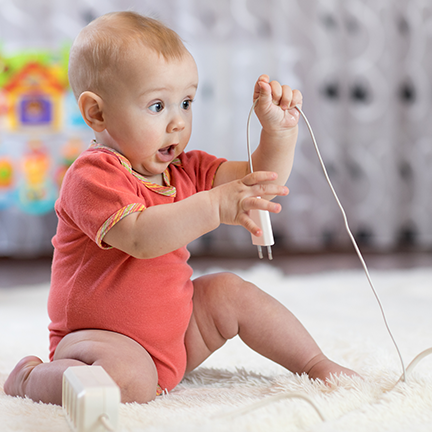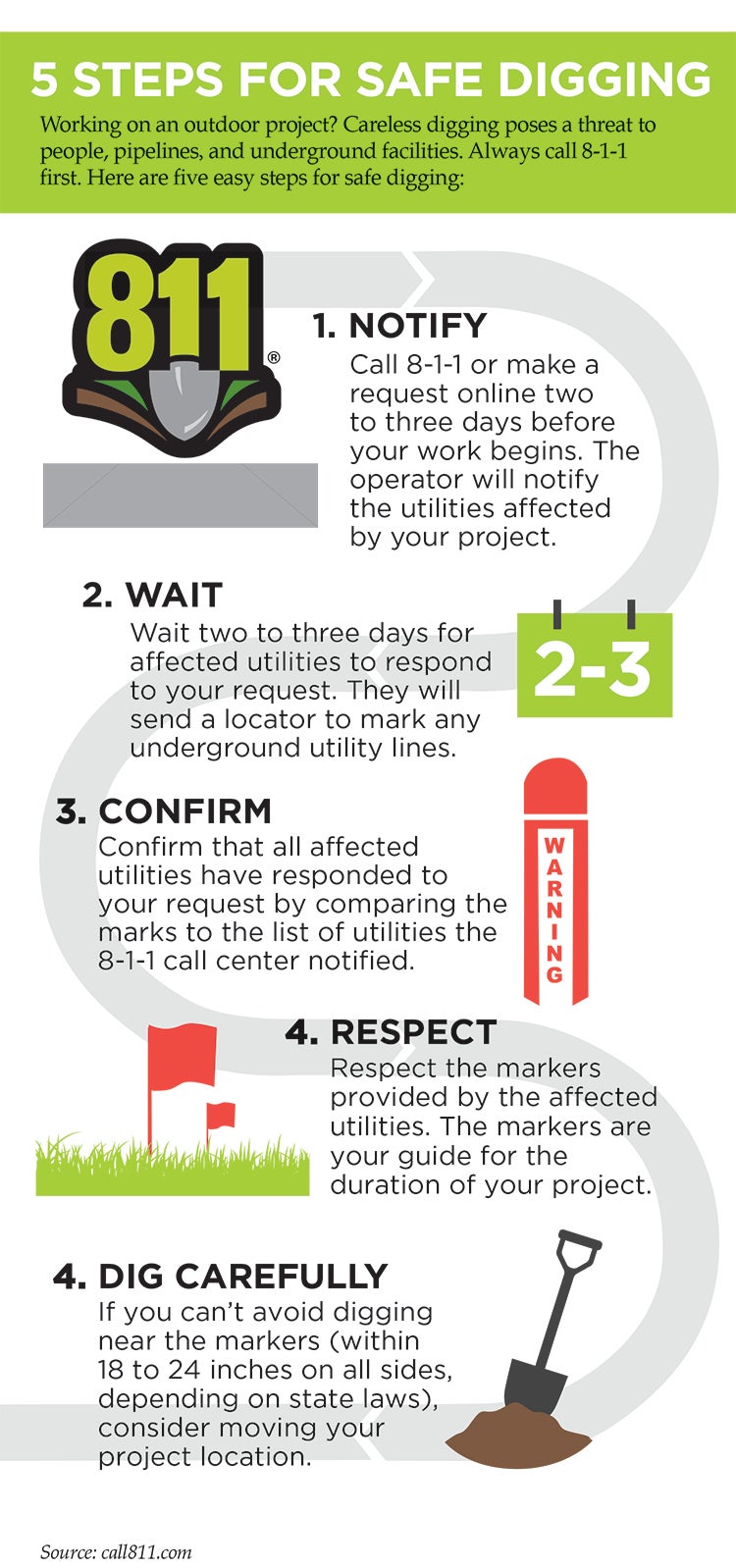Electric Safety Tips
 Electricity is safe and reliable, but it can be hazardous if used improperly.
Electricity is safe and reliable, but it can be hazardous if used improperly.
Here are some things you should and shouldn't do in your home when working with electricity or using powered devices.
Do:
Shut off power before performing electrical work
Shut off power at the circuit before performing any work on outlets, switches, light fixtures and other electrical equipment.
Install ground-fault circuit interrupter (GFCI) outlets
GFCIs monitor current flow in a circuit and shut it off if an imbalance is detected. Install them in the kitchen, bathrooms, outside and other potentially damp areas.
Use safety covers on unused outlets
Children can suffer serious shock or burn injuries if they insert objects into outlets. If children are present, install safety covers on all unused outlets.
Check for frayed, cracked or otherwise damaged electrical cords
Damaged cords may have exposed live wires that can be shock and fire hazards. Replace any damaged cords or replace equipment.
Unplug small appliances when not in use
Even when they're turned off, plugged-in devices can be a shock hazard if they fall into water. Unplug all small kitchen and bathroom appliances (such as blenders or hair dryers) when you're not using them.
Don't:
Use extension cords on a long-term basis.
Extension cords are not as safe as permanent house wiring or cords that go with equipment. Install more outlets if necessary, or move the powered device closer to an outlet.
Overload electrical circuits
Overloaded electrical circuits are a major cause of residential fires. To prevent circuit overloads, make sure all major appliances are plugged into a single wall outlet, and avoid plugging a lot of devices into one outlet.
Use indoor extension cords outside
Cords intended for indoor use are not made to withstand the climate and mechanical stresses of outdoor conditions. Use only weather-resistant extension cords marked for outdoor use.
Locate powered electrical cords under rugs or furniture.
Pressure from heavy weight or foot traffic can damage cords, creating a fire hazard. Move cords or furniture so that the cords are not covered.
Plug generators directly into an outlet or circuit panel
The electricity generated can backfeed to outdoor power lines, where it can injure or kill utility service personnel. Permanent standby generators can be connected to the home by an automatic transfer switch, which can prevent this from happening.
Is your home wiring safe? Signs of trouble include flickering lights and frequently blown circuits. If you suspect unsafe wiring conditions or other electrical problems, hire a qualified electrician to inspect your home.
Electric Safety at Home
 The following is a checklist of items that you can use throughout your home to help protect your family.
The following is a checklist of items that you can use throughout your home to help protect your family.
* These tips are for informational purposes only and do not supersede state or local building codes. Contact your local building inspector for information regarding requirements in your area. Remember that common sense and good safety habits are the best protection against electrical hazards.
- Make sure lightbulbs are the appropriate wattage for all fixtures.
- Cover all outlets with face plates that fit snugly to walls.
- If small children are present, install covers on all unused outlets.
- Keep electrical cords away from foot traffic, and make sure they're not covered by rugs or furniture.
- Avoid using extension cords on a long-term basis.
- Never use electrical devices, such as radios or hair dryers, when the bathtub is being used.
- Install only ground-fault circuit interrupter (GFCI) outlets in the bathroom. GFCIs monitor current flow in a circuit and shut it off if an imbalance is detected.
- Unplug small appliances when not in use.
- Unplug countertop appliances when not in use.
- Locate appliance cords away from heat sources, such as the stove or range.
- Make sure all kitchen outlets are GFCI protected.
- Avoid drinking liquid when using an electric blanket or heating pad. Don't cover an electric blanket when in use.
- Make sure electric blankets are in good condition; check for cracks or breaks in electrical cords.
- Turn off electric blankets and heating pads when not in use if they don't have a timer.
- Avoid plugging multiple devices into one outlet.
- Keep the electrical panel free from obstructions, and make sure your hands and the floor are dry before touching the panel.
- Install GFCIs in outlets located near clothes washers or wash tubs, or all outlets if it's damp.
- Place portable heaters and dehumidifiers on a stable and level surface, at least 3 feet from walls and other objects.
- Make sure portable heaters turn off when they tip over.
- Install protective covers on all outlets and make sure they're all GFCIs and weatherproof.
- Make sure power tools are in good condition and wires aren't cracked or frayed.
- Store power tools indoors to keep them from being damaged by water or excessive heat.
- When working outdoors, use only weather-resistant extension cords marked for outdoor use.
- Power lines may be underground as well. Before digging, call 811 to have utility lines marked.
Holiday Lighting Safety Tips
 Holiday lights can add to your seasonal celebrations, but they can also increase your risk of a house fire. According to the U.S. Fire Administration, holiday lights and decorations cause nearly 400 house fires each year. The following tips can help keep your family bright, happy and safe during the holiday season.
Holiday lights can add to your seasonal celebrations, but they can also increase your risk of a house fire. According to the U.S. Fire Administration, holiday lights and decorations cause nearly 400 house fires each year. The following tips can help keep your family bright, happy and safe during the holiday season.
- Use holiday lights that are approved by a nationally recognized testing organization, such as Underwriters Laboratories (UL).
- Before hanging your lights, inspect them for frayed wires, broken sockets or other signs of wear and tear.
- Avoid connecting more than three strings of lights together, unless the directions indicate otherwise.
- When using extension cords, avoid routing them under rugs or near walkways.
- If you decorate a real tree, water it every day and prevent the lights from coming into contact with tree branches.
- If you choose an artificial tree, make sure it's certified as fire resistant. Look for the UL label.
- For outdoor decorating, only use lights and power strips that have been approved for outdoor use.
- Keep electrical connections off the ground and make sure wiring is clear of downspouts, railings and aluminum siding.
- Fasten holiday lights securely to buildings, trees and other outdoor surfaces to prevent damage from wind or jostling.
- Be careful when using metal staples or nails as fasteners. They can damage the protective insulation covering the wires.
- Turn off lights late at night or whenever you are away from home. Consider using a timer.
- LED lights use up to 80% less energy than traditional lights and they have a longer lifespan. LEDs are also cool to the touch, reducing the risk of fire. Look for LEDs that are ENERGY STAR® certified.
Call Before You Dig
Buried electric, phone, cable, water or other facilities can be extremely dangerous if damaged, and they are costly to repair. Before you dig in the yard call Ohio Utilities Protection Service (OUPS). OUPS will notify all utility companies to locate facilities. By law, OUPS requires 48-hours notice.
Call OUPS any time at 800.362.2764 or 811, or visit www.oups.org


 Electricity is safe and reliable, but it can be hazardous if used improperly.
Electricity is safe and reliable, but it can be hazardous if used improperly. The following is a checklist of items that you can use throughout your home to help protect your family.
The following is a checklist of items that you can use throughout your home to help protect your family.